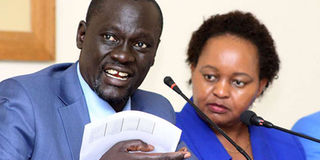Showdown looms over plan to rollback county funds

Council of Governors Chairman Josphat Nanok (left), flanked by his vice chairperson Anne Waiguru, addresses a media briefing at Intercontinental Hotel in Nairobi on September 10, 2018. Counties face budget cuts. PHOTO | DENNIS ONSONGO | NATION MEDIA GROUP
What you need to know:
- Uhuru wants the Equitable Shareable Revenue slashed by Sh9.04 billion from the Sh314 billion approved in the Division of Revenue Act, 2018.
- The long-standing policy is to keep development expenditure at 30 percent, but the rising wage bill has pushed recurrent spending to higher proportions.
Counties have no alternative but to reduce their spending this financial year after proposals to slash their budgets by Sh9.4 billion was approved.
And now a face-off is looming between the Executive and the Senate over the cuts.
The Council of Governors estimates the average loss for all counties will be Sh192 million, meaning each county will lose between Sh100 million and Sh200 million.
The biggest percentage of county spending is on recurrent expenditure, whose major item is the wage bill.
The Nation has learnt that senators are expressing displeasure with the proposals and have vowed to reject them, especially those touching on counties.
According to a source, senators have had behind the scenes meetings since President Uhuru Kenyatta announced his plan to reduce allocation to counties.
The senators resolved to reject this, especially after the National Assembly approved it.
REVENUE
According to the source, the senators will throw out the proposals once they get on the floor of the House. “We shall not play ball. We have made a decision to reject the reduction in allocations to counties,” one senator said.
In the proposed budget cuts, the President wants the Equitable Shareable Revenue slashed by Sh9.04 billion from the Sh314 billion approved in the Division of Revenue Act, 2018.
This means that counties will get about Sh305 billion, which is about Sh3 billion increase to what they received in the 2017/18 financial year.
The Senate will have to amend the Division Revenue Act (DORA) of 2018, the County Allocation Revenue Act, 2018 (CARA) and the Cash Disbursement Schedule to reflect the President’s proposals.
“None of this will happen. We are 100 per cent united on this. No county is losing money because of these proposals,” a senator who did not want to be named, said.
DORA is the law that divides revenue raised by the national government between the two levels of government.
EXPENDITURE
The Constitution provides that for every financial year, the equitable share of the revenue raised nationally that is allocated to county governments shall be not less than 15 percent of all revenue collected by the national government.
The amount is calculated on the basis of the most recent audited accounts of revenue received and approved by the National Assembly.
The Sh314 billion is based on Sh93 billion, being 33 percent of the audited and approved Revenue of the 2013/14 financial year.
The Budget Policy Statement 2018 allocated six conditional grants with a total allocation of Sh25.5 billion, nine percent higher compared with the total allocations approved in 2017/18.
CARA details horizontal share of the equitable shareable revenue among the 47 counties, while Cash Disbursement Schedule details monthly disbursement of money to counties.
The long-standing policy is to keep development expenditure at 30 percent, but the rising wage bill has pushed recurrent spending to higher proportions.
CONSULTATION
Of great concern to county bosses is the manner in which the National Treasury made reductions to the budgets without intergovernmental consultations.
Nairobi County, which has over the years maintained its lead position as the highest receiver of the equitable shareable revenue, will suffer the biggest loss of funds, at Sh454,762,300. The lowest loss of Sh102,162,300 will be felt by Lamu County.
The cuts were part of President Kenyatta's proposals to slash Sh52.6 billion from the Sh3.026 trillion budget for the current financial year.
The cash reductions at the county level are likely to slow down operations and development projects already hampered by delayed disbursement from the National Treasury.
“"The implication of the budget proposal is that each county will have to revise its allocation downwards during the supplementary phase. Essential services will be negatively affected,” Council of Governors Chairman Josphat Nanok said.




